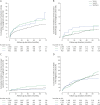Association of Alternative Anticoagulation Strategies and Outcomes in Patients With Ischemic Stroke While Taking a Direct Oral Anticoagulant
- PMID: 37225430
- PMCID: PMC10435051
- DOI: 10.1212/WNL.0000000000207422
Association of Alternative Anticoagulation Strategies and Outcomes in Patients With Ischemic Stroke While Taking a Direct Oral Anticoagulant
Abstract
Background and objectives: Ischemic stroke despite a direct oral anticoagulant (DOAC) is increasingly common and portends a high risk of subsequent ischemic stroke. The efficacy and safety of antithrombotic regimens after the condition are unclear. We aimed to compare the outcomes of patients with ischemic stroke despite DOACs with and without an alternative antithrombotic regimen and determine the risk factors of recurrent ischemic stroke while on anticoagulation.
Methods: In a population-based, propensity score-weighted, retrospective cohort study, we compared the clinical outcomes of DOAC-to-warfarin switch, DOAC-to-DOAC switch (DOACswitch), or addition of antiplatelet agents, with those of unchanged DOAC regimen (DOACsame) among patients with nonvalvular atrial fibrillation (NVAF) who developed the first ischemic stroke despite a DOAC from January 1, 2015, to December 31, 2020, in Hong Kong. The primary outcome was recurrent ischemic stroke. Secondary outcomes were intracranial hemorrhage, acute coronary syndrome, and death. We performed competing risk regression analyses to compare the clinical endpoints and determined the predictors of recurrent ischemic stroke in an unweighted multivariable logistic regression model.
Results: During the 6-year study period, among 45,946 patients with AF on a DOAC as stroke prophylaxis, 2,908 patients developed ischemic stroke despite a DOAC. A total of 2,337 patients with NVAF were included in the final analyses. Compared with DOACsame, warfarin (aHR 1.96, 95% CI 1.27-3.02, p = 0.002) and DOACswitch (aHR 1.62, 95% CI 1.25-2.11, p < 0.001) were associated with an increased risk of recurrent ischemic stroke. In the DOACsame group, adjunctive antiplatelet agent was not associated with a reduced risk of recurrent ischemic stroke. Diabetes mellitus, concurrent cytochrome P450/P-glycoprotein (CYP/P-gp) modulators, and large artery atherosclerotic disease (LAD) were predictors of recurrent ischemic stroke.
Discussion: In patients with NVAF with ischemic stroke despite a DOAC, the increased risk of recurrent ischemic stroke with switching to warfarin called for caution against such practice, while the increased ischemic stroke with DOAC-to-DOAC switch demands further studies. Adjunctive antiplatelet agent did not seem to reduce ischemic stroke relapse. Because diabetes mellitus, the use of CYP/P-gp modulators, and LAD were predictors of recurrent ischemic stroke, further investigations should evaluate whether strict glycemic control, DOAC level monitoring, and routine screening for carotid and intracranial atherosclerosis may reduce ischemic stroke recurrence in these patients.
Classification of evidence: This study provides Class II evidence that in patients with NVAF experiencing an ischemic stroke while being treated with a DOAC, continuing treatment with that DOAC is more effective at preventing recurrent ischemic stroke than switching to a different DOAC or to warfarin.
Copyright © 2023 The Author(s). Published by Wolters Kluwer Health, Inc. on behalf of the American Academy of Neurology.
Conflict of interest statement
Y.M.B. Ip, H. Ko, L. Lau, A. Yao, G.L.H. Wong, T.C.F. Yip, X. Leng, H. Chan, H. Chan, V. Mok, Y. Soo, and T.W. Leung report no disclosures relevant to the article. G. Lau received grants from Croucher Foundation, Research Fund Secretariat of the Food and Health Bureau, Innovation and Technology Bureau, Research Grants Council, Amgen, Boehringer Ingelheim, Eisai and Pfizer; and consultation fees from Amgen, Boehringer Ingelheim, Daiichi Sankyo, and Sanofi, all outside the submitted work. D. Seiffge received research funding from the Bangerter Rhyner Foundation and AstraZeneca. He served on advisory boards, consultancy, or speaker bureau for AsztaZeneca, Bioxodes, VarmX, Javeline, and Vifor. All fees were paid to his employer and used for research funding. All outside the submitted work. Go to
Figures



Comment in
-
Reader Response: Association of Alternative Anticoagulation Strategies and Outcomes in Patients With Ischemic Stroke While Taking a Direct Oral Anticoagulant.Neurology. 2023 Nov 28;101(22):1032-1033. doi: 10.1212/WNL.0000000000208002. Neurology. 2023. PMID: 38012014 Free PMC article. No abstract available.
-
Author Response: Association of Alternative Anticoagulation Strategies and Outcomes in Patients With Ischemic Stroke While Taking a Direct Oral Anticoagulant.Neurology. 2023 Nov 28;101(22):1033. doi: 10.1212/WNL.0000000000208004. Neurology. 2023. PMID: 38012015 Free PMC article. No abstract available.
References
-
- Lee JJ, Ha ACT, Dorian P, Verma M, Goodman SG, Friedrich JO. Meta-analysis of safety and efficacy of direct oral anticoagulants versus warfarin according to time in therapeutic range in atrial fibrillation. Am J Cardiol. 2021;140:62-68. - PubMed
-
- Stretz C, Wu TY, Wilson D, et al. . Ischaemic stroke in anticoagulated patients with atrial fibrillation. J Neurol Neurosurg Psychiatry. 2021;92(11):1164-1172. - PubMed
-
- Patel MR, Mahaffey KW, Garg J, et al. . Rivaroxaban versus warfarin in nonvalvular atrial fibrillation. N Engl J Med. 2011;365(10):883-891. - PubMed
-
- Granger CB, Alexander JH, McMurray JJ, et al. . Apixaban versus warfarin in patients with atrial fibrillation. N Engl J Med. 2011;365(11):981-992. - PubMed
-
- Connolly SJ, Ezekowitz MD, Yusuf S, et al. . Dabigatran versus warfarin in patients with atrial fibrillation. N Engl J Med. 2009;361(12):1139-1151. - PubMed
MeSH terms
Substances
LinkOut - more resources
Full Text Sources
Medical
Research Materials
